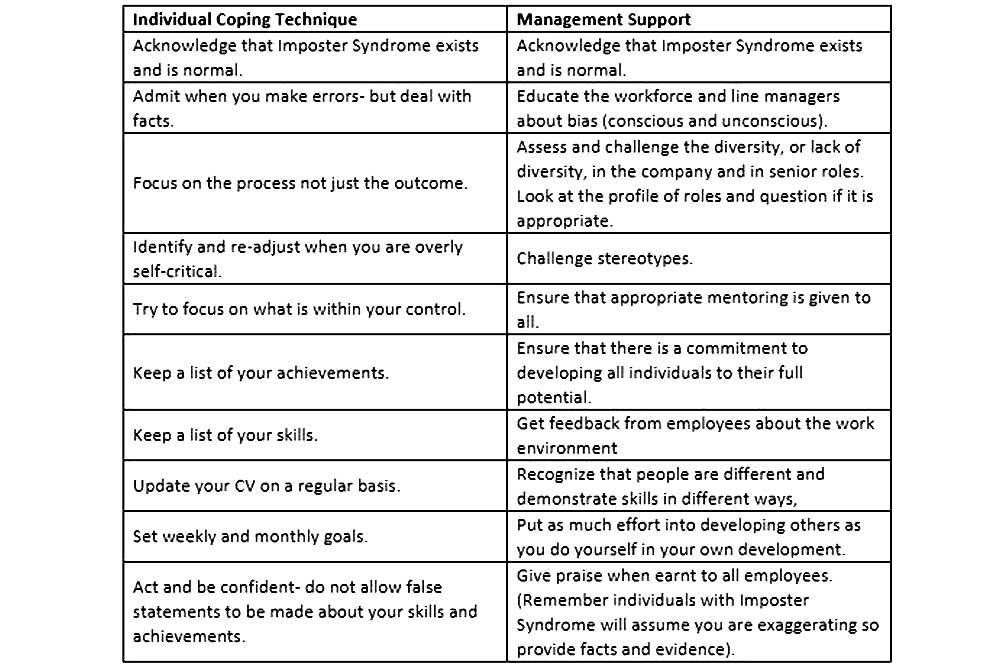
Image by Quartz at Work ©
We’re lucky to be born in a time when women have so many opportunities and choices, however we undoubtedly still face some barriers. And one of the biggest ones is a lack of self-confidence and the fact we aren’t aware of the values we bring to the table. While we work hard to ensure the job is done well and succeed in scaling the career ladder we set for ourselves, there’s always something we feel hasn’t’ been achieved satisfactorily. We subsequently talk ourselves down and beat ourselves up. Should I have been more assertive, maybe more organised or come up with a more tactical solution? And with many of us having to juggle childcare responsibilities and a career during lockdown, questioning our abilities and feeling unworthy of success has become even more commonplace.
A new survey answered by 40 leading female CEOs, company executives and founders discovered that a high number suffer from Imposter Syndrome. This has been described by Dr Andrea Utley from the University of Leeds as “a psychological term that refers to a pattern of behaviour where individuals have doubts about their ability and constantly fear that they are a fraud.”

Image Via The Muse
The survey, distributed by the leading trading company, IG, revealed that despite being hugely successful, 87 percent (over four in five) of those assessed said they had suffered from Impostor Syndrome symptoms within the past six months and have self-reported very low confidence levels. The research results also found 70 percent of businesswomen felt bosses didn’t take them seriously in comparison to their male counterparts. Additionally, 81 percent reported being the victim of gender-based discrimination in the workplace.
The research adds to IG’s existing look into the gender and diversity pay gap among FTSE 100 companies, and the barriers women face in leadership roles. And the survey’s respondents were asked various questions, one of which being whether they had ever experienced Imposter Syndrome symptoms after being provided with an official definition.
A focus on Imposter Syndrome
IG spoke to Utley about Imposter Syndrome and low confidence among successful businesswomen. The psychologist said a large number of people all over the globe experience Imposter Syndrome, which causes “self-doubt, dips in confidence, and has a negative impact on individual and group performance.” (In 2019, the figure was 72 to 92 percent.) And it is more often reported in underrepresented populations such as women and people of colour. Utley also said, “the causes are complex, deep rooted, and representative of cultural and societal values that have a narrow definition of normal, are biased towards dominate groups and show stereotypical views of ability.”
While explaining why women suffer more with Imposter Syndrome than men, Utley said the gender pay gap leads to the belief that men are more esteemed than women. She also said those with Imposter Syndrome symptoms believe their success was a stroke of luck or down to good timing, rather than skill or hard work.

“Women tend to do this more than men, as women and underrepresented groups are more likely to be questioned regularly by others (‘Are you sure that is right?’), with negative assumptions made about their abilities (‘It’s very technical - maybe we should ask Tom?’), which subsequently limits the roles they are given and lowers their confidence,” the psychologist said.
Here’s what businesses and individuals can do
IG also explored what practical steps can be taken to remedy the situation, as everyone benefits from a diverse workforce that includes strong and confident women. By reducing the numbers of people who suffer from Imposter Syndrome, “we strengthen the talent pool and grow the potential of businesses and develop individuals to their full potential,” according to Utley.
Here are Utley’s 10 steps businesses and individuals can take to help overcome feelings of self-doubt.


















